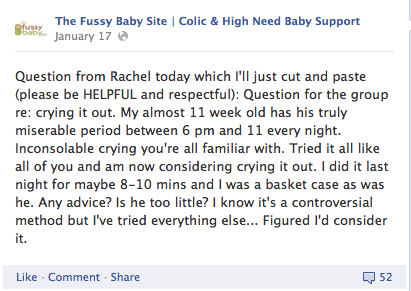Sleep and Fussy Babies
Many parents of fussy babies complain that their little ones are unpredictable when it comes to sleep. In fact, sleep issues are one of the most common problems brought up by members of our Facebook support page:
Colicky or fussy babies may have trouble falling asleep, may wake often at night, refuse naps, or take very short naps. Living in the midst of all this unpredictability can be very taxing on you, as the parent.
Out of desperation, many parents end up using the Cry-It-Out method of sleep training, as they feel they have run out of options.
I know I’ve often felt like I can get through anything, as long as I know when I’m ‘off duty’. But unfortunately, it seems like these high need little babies – the ones who seem to need the most sleep – sleep the least. And this can result in a tired, grumpy baby (and mommy!); as if your little one wasn’t already grumpy enough.
Sleep researcher and well-known pediatrician, Marc Weissbluth, promotes establishing sleep routines for infants, in his sleep handbook, Healthy Sleep Habits, Happy Child. He repeatedly emphasizes the need for infants to have regular, established naps, early bedtimes (6-8pm after 6 weeks old), and to (eventually) learn how to soothe themselves to sleep.
See how I got my colicky son to sleep 12 hours straight!
Sleep Signals
These are the obvious signs that your baby is ready to sleep. By putting your baby down immediately when you see these signs, you have the best chance at catching their sleep window; the time when they are naturally the calmest and most ready to sleep.
The following behaviours are indications your baby is likely read to go to sleep:
- Decreased activity
- Slower motions
- Less vocal
- Sucking is weaker or slower
- Quieter and calmer
- Appears disinterested in surroundings
- Eyes are less focused
- Eyelids drooping
- Yawning
If you wait too long, your baby will move into the overtired state, and it may become harder to put him down. He may resist sleeping, and may cry when you put him down. The signs that he is moving into the overtired state are:
- Fussing
- Rubbing eyes
- Irritability
- Crankiness
Of course with a baby that’s already fussy to begin with, it can be very difficult to know when they’re tired and when they’re just fussy. In these cases, it’s even more important to watch out for the sleep cues above, so they don’t enter the overtired state.
cases, it’s even more important to watch out for the sleep cues above, so they don’t enter the overtired state.
Another way to tell when your infant is ready for sleep is to watch the clock. Ideally, paying attention to their sleepy cues, along with watching the clock, gives you the best chance at some successful sleep. How long a baby can be awake before entering the overtired state depends a lot on their age.
- 0-4 month olds can generally handle 1-2 hours of wakefulness before being ready to be soothed to sleep.
- 5-7 month olds can go around 2 hours, whereas
- 8-12 month olds do best staying up for around 3 hours at a time.
As the mother of 2 fussy babies, I’ve found that I’ve needed to focus on looking for sleepy cues, as well as the clock. On particularly fussy days, I only watch the clock. If I had put my son down whenever he became cranky or fussy, he’d have been napping all day!
Establishing a Sleep Routine
An important element in helping your baby sleep is to consistently use the same soothing techniques and routine. By doing this, you’re helping her to learn that each time mommy does ‘x’ (whatever soothing technique you decide to use), it’s time to go to sleep. It’s not as important what technique you choose, as long as you’re consistent.
Some ideas you might want to use to incorporate into your sleep routine include:
- A bath
- Massage
- Changing into pajamas
- Dim lights
- Feed
- Sing
- Close the curtains
- Read a story
- Swaddle
I would suggest experimenting to see what works best at calming your baby. I found with my first child, for instance, that giving her a bath before bedtime actually energized and excited her. When my son was a newborn, rocking him did the trick, and now that he’s a little older, singing him a favorite song immediately results in a yawn.
Keep in mind that while fussy babies need and even crave routine, it can take a few days to a week (or more) for them to adjust and settle into a new routine. It may not seem like a particular routine is working for your baby, but be sure to give it enough time before you switch routines.
How to Track Your Baby’s Sleep Routine
I would highly suggest that you track your baby’s sleeping habits and routine. In the midst of diaper changes, crying, fussing, and feedings, it can be difficult to remember when your baby’s last nap ended, or what you did to successfully get her to sleep.
You can track your baby’s routines using a spreadsheet on your computer, an app on your smartphone, or even on a notepad. Regardless of what method you use, just be sure to track your baby’s entire routine, not just their sleep.
Foods they’re consuming, formulas they drink, activities they do, and their crying and fussing habits all play a role in figuring out your baby’s optimal sleep routine.
What if None of this Works for My Newborn?
If you have a young baby who cries excessively, and a medical cause has been ruled out, he or she may have been labeled as colicky. It is Dr. Weissbluth’s belief that overtiredness in newborns is often misdiagnosed as colic.
Don’t worry about spoiling your colicky infant, or work too hard at establishing a routine until 3 or 4 months of age, when the colic subsides. It may even turn out that your previously inconsolable, red-faced, non-sleeping baby turns a corner at 12 weeks and is suddenly easily soothed to sleep.
Get help. Get Dad on board, as well as friends, relatives and parents. Hire help, because mothers get sleep deprived so quickly. After 3 or 4 months, make the appropriate transition to help your child learn self-soothing skills, which they cannot learn during those first 3-4 months due to this very fussy stage. It’s better to teach these post colicky babies self-soothing skills than create enduring sleep problems. – Marc Weissbluth
Other Posts You May Like
Best Products for Fussy Babies
50+ Best Toys & Products for Spirited Kids, 0-5: Christmas Gift Guide
“Why are You So Tired?”: Here’s Why New Moms Are Walking Zombies
A Possible Treatment Or Cure For Colic?
Why I Now Recommend the Graco DreamGlider Swing & Sleeper

